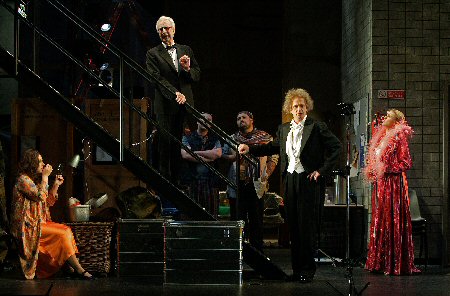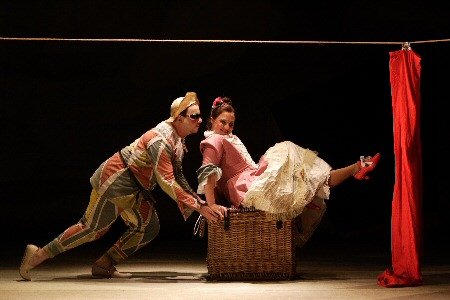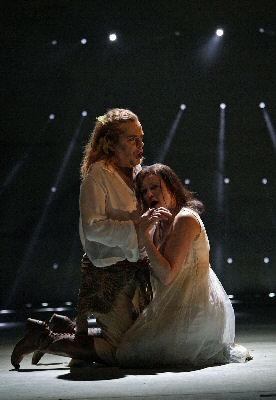|
Editor: Marc Bridle
Webmaster: Len Mullenger
|
Seen and Heard Opera Review
Director: Neil
Armfield Choreographer: Denni Sayers Welsh National Opera Orchestra
Major-Domo: Richard Van Allen Music Master: Gerd Grochowski Composer: Alice
Coote The Primadonna / Ariadne: Janice Watson
Photographs by Clive Barda
The plot is in two acts. In the first, a ‘prologue’ explains how a rich Viennese man commissions a new opera from a young composer to entertain his dinner guests. The opera tells of Ariadne’s abandonment by Theseus on the island of Naxos and is meant to be deadly serious. The composer is outraged when a major-domo announces that the opera will be followed by a Harlequinade and then fireworks, ‘at nine o’ clock precisely.’ Worse is to come: the rich man changes his mind decreeing that the performances must run simultaneously, with the opera punctuated by comedy. The composer explains to Zerbinetta, the Harlequins’ leader, that his tragedy will be ruined. Zerbinetta is not convinced and joins him in a duet in which the composer comes close to declaring that he loves her. The Composer sings finally of how music is the most sacred of all the arts.
When the ‘opera’ takes place in Act II, Ariadne languishes on Naxos watched by Naiad, Dryad and Echo. She sings of her grief and longing for death, while the comedians make fruitless attempts to cheer her up with comic songs and dancing. Zerbinetta tries again, as woman to woman - her experience is that that a new man heals any broken heart. Ariadne is doubtful until the youthful God Bacchus arrives having escaped the embraces of Circe. Ariadne first sees him as the messenger of death, but succumbs to his advances and is translated into a Goddess. Zerbinetta was right, and she says so.
Hugo von Hofmannsthal’s text is about how Art must coexist with Reality and somehow perhaps be reconciled; even if only through ‘mutual incomprehension’ as William Mann once put it. Neil Armfield deals with this by contrasting the back-stage life of the two theatre companies with their behaviours before an audience. In the Prologue, the opera singers (who are all pretty high-powered; their dressing chests have ‘Wien Kammersänger’ written on them) are self-important fools, made to look clown-like because of the pyjama coveralls that hide their costumes. The Harlequins are no-nonsense sort of people, grown-ups who are not fazed at all when their act must fit into the opera. ‘Hey,’ they seem to be saying, ‘It’s a show that’s all. We’re getting paid folks.’
To bring this all of this off of course (and it could have gone wrong easily) requires a strong cast of actor/ singers. Richard van Allen in the non-singing role of the Major-Domo set the tone from the outset; his excellent German and his explosive stresses on the word ‘Feuerwerke’ tickled many a rib and George Newton-Fitzgerald’s flouncing for Austria as the ultra-camp Wig-Maker added to the fun no end. The Prologue’s dominating figure is the Composer however, and to this difficult trouser – role Alice Coote brought convincing characterisation as well as particularly moving singing in both her duet with Zerbinetta and her song of praise to Music.
Katarzyna Dondalska is also a fine actress as her encounter with Harlequin and her other suitors showed in Act II. Her singing was at its best in its upper range and her scena with Ariadne flowed effortlessly from ‘Grossmächtige Prinzessin’ through to ‘So war es mit Pagliazzo,’ taxing as these numbers are.
The men in the comedian troupe were all on good form too, with genuinely funny singing and dancing from all of them. D’Arcy Bleiker may fairly be singled out for his solo attempt to cheer Ariadne but Andrew Mackenzie-Wicks (Scaramuccio,) Tim Murfin (Truffaldino) and Wynne Evans (Brighella) were also in particularly good form. Not a note out of place and genuine comic talents, all four of them.
The last time I heard Janice Watson (in Royal Opera’s ‘Peter Grimes’) I broke the habit of a lifetime and called her singing ‘radiant.’ There was no other word though and there still isn’t, so I’m unrepentant: she was at her best once again in this performance. Having said that however, it will also be a long time before I forget her facial expression when the comedians were singing to her; one of the funniest things I’ve seen in years.
Lastly then, to Peter Hoare’s Bacchus which was extremely impressive both in his solo entry and the big duet with Ariadne. As difficult a role as any in the tenor repertory, and arguably more taxing than some Wagner, Bacchus takes its toll on many fine singers. There was no problem here though and well deserved congratulations are due to Peter Hoare for this performance.
It was good to see Carlo Rizzi back in the pit, once again as WNO’s Musical Director. The orchestra clearly appreciated his return and under his firm and skilfull hand rewarded both him and the audience with the fine playing that is their hallmark. A splendid evening.
Bill Kenny
Back to the Top Back to the Index Page |
| ||
|
||||





